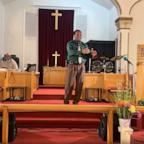Lack of Good Sleep Might Be Deadly
June 12 -- THURSDAY, June 11 (HealthDay News) -- Two new studies suggest that chronic poor sleep can actually boost your odds for dying prematurely, while another study finds that more than half of older Americans aren't getting the recommended eight hours of slumber.
All three studies were presented this week at the Associated Professional Sleep Societies annual meeting, in Seattle.
The first study, from a consortium of researchers, found that death rates were higher among people who had more "fragmented" sleep, meaning they had more transitions between stages of sleep per hour. Those stages were: wake-to-non-rapid-eye-movement (NREM); NREM-to-wake; NREM-to-REM; REM-to-NREM; and REM-to-wake.
Although few studies have looked at fragmentation specifically, other studies have found that sleep-disordered breathing, which can contribute to sleep fragmentation, can increase the risk for early death.
Over the eight years of the study, participants with more fragmented sleep had a 5 percent increased chance of dying.
The wake-to-non-REM and non-REM-to-wake transitions were most closely linked to the higher risk of dying. The odds of dying were actually less with the other transition types.
"We're learning more about how slow-wave sleep has effects on the body, helping people relax, lowering heart rate, lowering blood pressure," said Dr. Carl Boethel, an assistant professor of internal medicine at Texas A&M Health Science Center College of Medicine and associate director of the sleep disorders clinic at Scott & White. "We think those things are very important."
But, pointed out Dr. Nicholas Rummo, director of the Center for Sleep Medicine at Northern Westchester Hospital Center in Mount Kisco, N.Y., it's impossible to tell what conditions are underlying these sleep deficiencies, conditions that ultimately may be "at fault."
"I don't think one should get too excited about it because 5 percent is not a big change as far as epidemiological studies are concerned," Rummo said. "Sicker people, for whatever reason, will have disturbed sleep. It's a chicken-and-egg argument. Is it the sleep itself that is making people die or some underlying factor that sleep is reflecting? Sleep is a very sensitive indicator as to how well we are."



